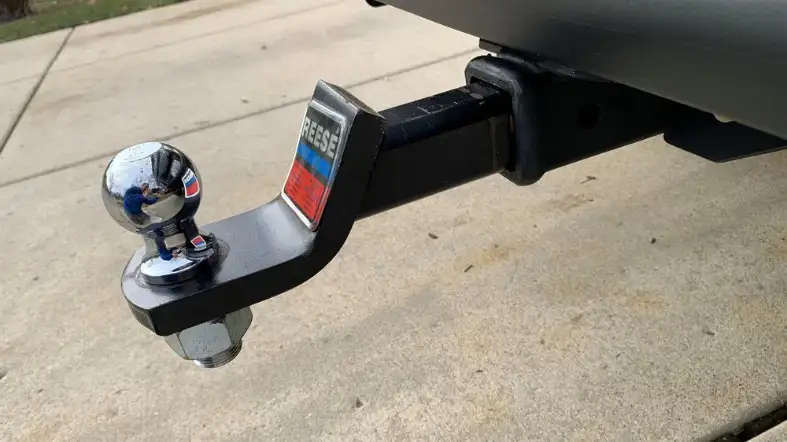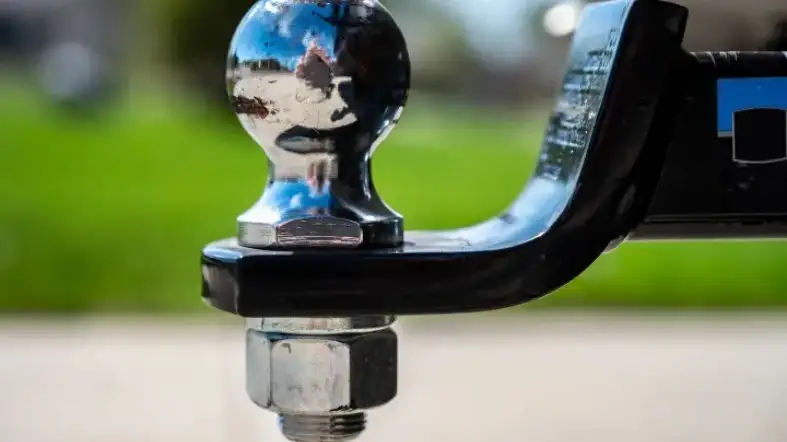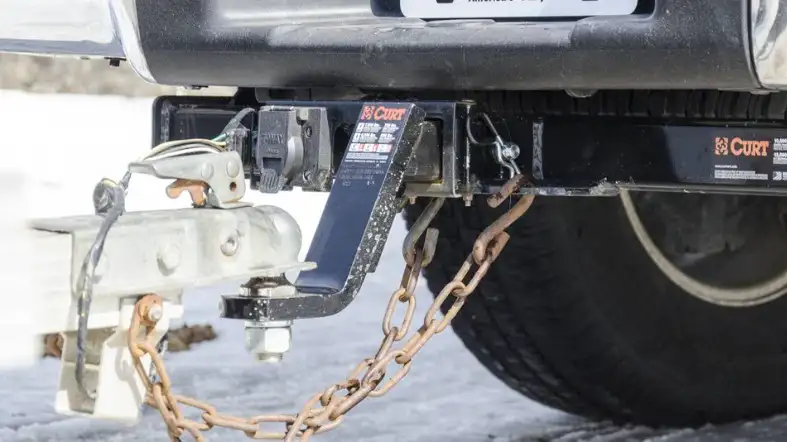In the world of towing and trailer hitching, getting the right setup is essential for safe and efficient journeys.
One common question that arises is, “How far should a hitch stick out?” The proper hitch extension is vital to ensure your trailer is adequately attached to your vehicle.
In this comprehensive guide, we’ll explore the factors influencing the ideal hitch extension length, the potential consequences of improper extensions, and how to determine the perfect distance for your specific towing needs.

How Far Should A Hitch Stick Out?
The ideal hitch extension length varies based on factors like trailer type, vehicle design, and local regulations. Generally, the hitch should extend 12 to 24 inches (30 to 60 centimeters) beyond the rear bumper to ensure safe towing with sufficient clearance between the vehicle and the trailer.
To get a clear understanding of the appropriate hitch extension length, let’s delve into some essential considerations:
1. Trailer Type and Design
The type of trailer you are towing plays a significant role in determining the ideal hitch extension length.
For instance, conventional trailers, such as utility trailers or camper trailers, typically require a longer hitch extension to ensure sufficient clearance between the towing vehicle and the trailer.
On the other hand, small trailers, like bike trailers or jet ski trailers, may not need an extended hitch due to their compact size.
2. Towing Vehicle Specifications
The design and dimensions of your towing vehicle should also be taken into account.
Some vehicles, such as trucks or SUVs, have an extended rear end, which can affect how far the hitch needs to stick out to achieve proper towing alignment.
Additionally, the hitch receiver’s location on the vehicle’s frame can influence the required extension length.
3. Local and State Regulations
Local and state regulations may impose specific requirements on how far a hitch should stick out from your towing vehicle.
These regulations are put in place to ensure road safety and prevent potential hazards caused by improper hitch extensions.
It’s crucial to familiarize yourself with these regulations before hitting the road to avoid any legal issues.
4. Maneuverability and Handling
The length of the hitch extension can affect the maneuverability and handling of your towing setup.
A longer hitch extension may lead to increased trailer sway and reduced stability, especially when navigating sharp turns or winding roads.
Striking the right balance between clearance and control is crucial to ensure a smooth towing experience.
5. Trailer Tongue Weight
The tongue weight, which is the downward force exerted by the trailer on the hitch, is another factor to consider when determining the ideal hitch extension.
A properly balanced tongue weight helps distribute the trailer’s weight evenly over the towing vehicle and the trailer’s axles, promoting stability and control during towing.
Finding the Perfect Hitch Extension Length

Now that we’ve covered the essential considerations, let’s explore how to find the perfect hitch extension length for your specific towing setup:
1. Measure the Trailer Width
Start by measuring the width of your trailer. Measure from the outer edges of the trailer, excluding any side mirrors or additional attachments.
This measurement will serve as the basis for determining the minimum clearance required between the trailer and the towing vehicle’s rear end.
2. Measure the Towing Vehicle’s Rear End
Next, measure the distance from the rear bumper to the furthest point of your towing vehicle’s rear end.
This measurement will help determine how much clearance you need between the trailer and the vehicle when making turns.
3. Consider Local Regulations
Check the local and state regulations regarding hitch extension lengths.
Ensure your chosen extension length complies with these requirements to avoid any legal issues while on the road.
4. Factor in Tongue Weight
Calculate the tongue weight of your trailer, ensuring it falls within the recommended range for your towing vehicle.
The tongue weight should typically be around 10-15% of the trailer’s total weight for optimal towing stability.
5. Test the Setup
Before embarking on a long journey, conduct a test run with your towing setup to ensure it functions correctly.
Pay attention to how the trailer behaves during turns, accelerations, and braking. Adjust the hitch extension length if needed for improved stability and control.
Importance Of Proper Hitch Length:

1. Towing Stability:
A properly sized hitch ensures that the trailer and the towing vehicle are aligned correctly, enhancing towing stability.
When the hitch length is appropriate, the weight of the trailer is evenly distributed between the two, reducing the risk of swaying or fishtailing during travel.
2. Control and Handling:
The right hitch length allows for better control and handling of the towing setup.
With the trailer properly attached, the towing vehicle responds predictably to steering inputs, making it easier to navigate corners and curves safely.
3. Road Safety:
Safety on the road is paramount, and having the proper hitch length contributes to it significantly.
An incorrect hitch length can lead to dangerous situations, such as loss of control or jackknifing.
Ensuring the right hitch length helps prevent accidents and keeps everyone on the road safe.
4. Protecting Towing Components:
Using the correct hitch length prevents unnecessary strain on towing components, such as the hitch receiver and trailer tongue.
Proper alignment minimizes wear and tear, extending the lifespan of these vital parts.
5. Avoiding Excessive Trailer Sway:
An improperly sized hitch can result in excessive trailer sway, especially when driving at higher speeds or in windy conditions.
This can be nerve-wracking for the driver and potentially dangerous for everyone on the road.
6. Fuel Efficiency:
Proper hitch length can also influence fuel efficiency.
When the trailer and towing vehicle are in harmony, there is less resistance and drag, leading to improved gas mileage during towing trips.
7. Legal Compliance:
Using the correct hitch length ensures compliance with local and state regulations.
Different jurisdictions may have specific requirements for hitch length, and adhering to these guidelines is essential to avoid legal issues while towing.
What Happens If The Hitch Is Too Low?
1. Poor Towing Stability
When the hitch is too low, it can cause poor towing stability.
The trailer’s weight may not be distributed evenly over the hitch, leading to an uneven load distribution between the vehicle and the trailer.
As a result, the rear of your vehicle may sag, causing the front wheels to lose some traction.
This can make steering more difficult and reduce your overall control over the vehicle and trailer combination.
Additionally, poor towing stability may increase the likelihood of swaying or fishtailing, especially at higher speeds or in windy conditions, making towing unsafe.
2. Ground Clearance Issues
A low hitch can also cause ground clearance issues.
If the hitch is too close to the ground, it increases the risk of scraping or hitting the hitch on steep driveways, speed bumps, or uneven terrain.
This can not only damage the hitch but also harm the undercarriage of your vehicle or the trailer.
In extreme cases, the hitch could get stuck or cause a sudden jolt to the trailer, potentially leading to damage or accidents.
3. Uneven Trailer Weight Distribution
Proper weight distribution is essential for safe towing. If the hitch is too low, it may result in uneven weight distribution on the trailer’s axles.
This can cause excessive strain on one side of the trailer, leading to tire wear and even tire blowouts.
Uneven weight distribution may also lead to poor braking performance, making it challenging to stop the vehicle and trailer efficiently, especially in emergencies.
4. Reduced Braking Effectiveness
When the hitch is too low, it can negatively impact the effectiveness of the trailer’s brakes.
In this scenario, the trailer’s weight may push down on the rear of the towing vehicle, reducing the weight on the front wheels.
As a result, the front wheels may not have enough traction for optimal braking performance, leading to longer stopping distances and potential braking issues.
5. Increased Stress on Towing Components
A low hitch can put increased stress on various towing components, such as the hitch receiver, trailer tongue, and suspension systems.
The improper alignment between the vehicle and the trailer can cause unnecessary strain on these parts, leading to premature wear and potential breakdowns during towing trips.
Frequently Asked Questions
Can I use any hitch extension length?
No, using any hitch extension length is not recommended. The extension length should be carefully chosen based on your trailer type, towing vehicle specifications, local regulations, and tongue weight to ensure safe and stable towing.
Can I exceed the recommended tongue weight?
No, exceeding the recommended tongue weight can lead to towing instability and may strain your towing vehicle’s suspension system. Always stay within the specified tongue weight limits for your towing setup.
Can A Hitch Be Too Short?
Yes, a hitch can be too short. If the hitch is too short, it may not provide enough clearance or stability for the trailer, which can cause problems when towing.
Can I use a hitch extender for all types of trailers?
Hitch extenders are not suitable for all types of trailers. They work best for conventional trailers but may not be compatible with some specialty trailers or those with unique design features.
Conclusion:
Determining how far a hitch should stick out is a crucial aspect of safe towing.
By considering factors such as trailer type, towing vehicle specifications, local regulations, maneuverability, and tongue weight, you can find the perfect hitch extension length for your specific setup.
Always prioritize safety and compliance with local laws to enjoy smooth and secure towing experiences on your adventures.
